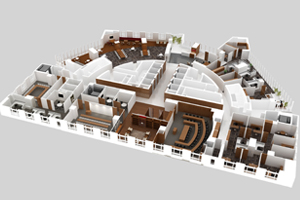China digs
As the University announces its Center in Beijing, students make their own ambitious plans surrounding China. *
By Amy Braverman Puma
Image courtesy Robarts Interiors and Architecture, Beijing

A rendering of the University’s Center in Beijing, in the Haidian District.
On May 15, experts from around the globe will gather at International House to discuss “China and the Future of the Global Economy,” with panels focusing on China’s economic growth, its response to climate change, and its financial markets. Justin Yifu Lin, PhD’86, chief economist and senior vice president of the World Bank, will offer a keynote address, and Nobel Prize–winning Chicago economist Robert Fogel, along with other big names from academia and the financial industry, will sit on the panels.
Although it comes less than a month after President Robert J. Zimmer traveled to China to announce that Chicago’s Center in Beijing officially opens in September (see “Eastward Bound,” Jan–Feb/10), the I-House conference began independently of the University’s efforts. It was planned mostly by undergraduates.
One of those planners, economics and mathematics major David Haisha Chen, ’12, explains that the timing was a “total coincidence”; the students have been fundraising and preparing all year. But it’s a happy coincidence: he praises the nascent Beijing Center—Chicago’s fourth overseas site—as a “great way for the University to establish its global presence.” He’s not the only eager Chicagoan: before Zimmer’s April 26 announcement, 85 alumni had signed up for the subsequent reception at the Grand Hyatt Beijing, and more were expected to attend.
Chen, who’s from Guangzhou, says the center will help inform Chinese “about the University of Chicago and our hunger for knowledge.” He’s already an ambassador: last summer he helped to host send-off parties for incoming students, and Chen hopes to hold speaker series and admissions presentations in China as well.
First he’ll get through the conference. A cofounder of Moneythink, a group that teaches financial literacy to inner-city high schoolers, Chen joined with his friend May Chen, ’12, who’s active in the Chicago Society, which plans campus events around important issues. The Chicago Society last held a China forum, “China and the Future of the World,” in 2006. The two conceived this year’s conference, David Chen says, to raise awareness about “the current economic importance of our hometown.”
The China Career and Culture Club also joined as organizers. After the group approached Fogel, he helped connect them with Lin. University administrators assisted with inviting other speakers and panelists. Sponsors include I-House, the Center for East Asian Studies, and Student Government.
During the global recession, says Chen, the group believes “it is time to study some emerging markets.” The conference will explain “how China has quickly responded to the crisis and what role” it will play in global markets as financial systems get rebuilt.
Although he plans to become an investment banker after college, Chen, part of this spring’s winning Student Government slate, is also interested in “social entrepreneurship, especially ventures in education,” he says. “It all depends on how my internship at Goldman this summer goes.”
The genesis of the Chicago Society’s May 15 conference, “China and the Future of the Global Economy,” was incorrectly detailed in the May-June/10 “Editor’s Notes.” We regret the error—and offer a short history of the team effort that led to the conference:
In January 2008, inspired by the success of the 2006 Chicago Society Conference on China and the Future of the World chaired by Daniel Michaeli, AB’07, three Chicago Society members—Marcus Petersen, Lane McIntosh, and Haijing (Crystal) Huang, all AB’10—decided to organize another conference on China, focused on economic issues.
In 2009, Huang picked up the conference’s leadership role: leading its working group meetings, developing the conference program, writing the panel concept notes, designing print materials and web content, communicating with conference speakers and invitees, raising funds, and delivering introductory remarks at the conference.
She was supported by a strong team, some of whom are listed here. Among their many accomplishments, May Chen, ’12, secured the conference’s keynote speaker, Justin Lin, PhD’86; doctoral student Quan Zhang, SM’08, helped invite several private-sector speakers; and David Chen, ’12, helped liaise with the Univerity administration, facilitating media coverage and advertising on campuses of other universities. Teng Bao, ’12, did the IT work and designed the conference website. Then there were the 30-plus volunteers (many of them Chicago Society members) who acted as ushers, lunch servers, and general helpers throughout the Saturday conference.
Support also came from University faculty, student organizations, and sponsors. Professor Robert Fogel offered advice on the conference agenda, Professor Dali Yang provided backing from the Center for East Asian Studies, Professor Bruce Cumings and other faculty members gave their support and moderated the panel discussions. Student Government provided financial support to the conference. Moneythink, which joined the team in winter 2010, helped with fundraising and marketing. The Cultural and Career Club and International House Global Voices Program also supported the conference. The team was very grateful for the venue and other logistic support provided by the I-House.
Last but not the least, the conference team received strong support from the University adminstration and from President Zimmer, with Vice President David Greene speaking on behalf of the University at the conference’s opening.
